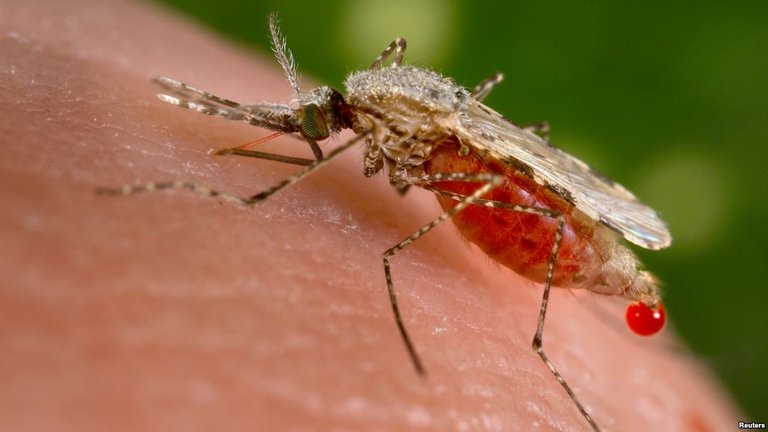
Malaria in Cambodia is caused by two types of viruses transmitted by female mosquitos, according to the CNM.
PHNOM PENH —
Som Aun contracted malaria after moving to Koh Kong province’s Thma Bang district in 2002. Four years later, two of his children fell victim to the infectious disease.
Aun told VOA Khmer that his children had remained infected for more than five years because no doctors had been able to provide successful treatment.
“Sometimes the disease is healed for one month, but it would come back in the next two months,” he said.
Aun is not sure why his children have not been cured, but there is growing concern that a strain of drug-resistant malaria in the region - labeled a “superbug” by researchers - has led to the failure of artemisinin-based therapies.
Last month, a group of scientists from the Mahidol Oxford Tropical Medicine Research Unit (MORU) announced that the “superbug” had spread from western Cambodia to southern Vietnam, leading to alarming treatment failure rates.
The experts blamed a mutant strain of malaria - P falciparum C580Y - in the Mekong region and said it posed a serious threat to malaria control and eradication efforts.
Cambodia adopted dihydroartemisinin-piperaquine, the treatment to which resistance has apparently grown, but has since been forced to switch to artesunate-mefloquine. The resistance was identified in the western Cambodian region of Pailin, later spreading to northeastern Thailand and southern Laos, according to a statement published by The Lancet.
“We now find that the PfPailin lineage, with associated piperaquine resistance [evidenced by amplification in the PfPlasmepsin2 gene], has spread to the south of Vietnam where it is responsible for alarming rates of failure of dihydroartemisinin-piperaquine,” the statement said.
Prof. Arjen Dondorp, deputy director of MORU, said in an email that artemisinin resistance may have been encouraged by the use of sub-standard drugs to treat malaria.
Once resistance is established through mono-treatments, it quickly spreads to more resilient forms of treatment because the now weaker artemisinin component can no longer protect the partner drug adequately, he wrote.
“Malaria is a disease of the poor and disenfranchised. These are often populations living in border areas and in or near to the forest,” he said.
A dominant strain of drug-resistant falciparum malaria, first detected in 2008 in Cambodia, has since spread to other Mekong countries, according to a study released in February by the Worldwide Antimalarial Resistance Network.
Worryingly, the authors noted, developments in the region had created a multi-drug-resistant form of the malaria parasite, they said.
But Dondorp, the MORU deputy director, said several mutations in the bacteria had been identified in the so-called Kelch gene, adding that it was one such mutation that had spread across the region and picked up piperaquine resistance.
The parasite, he explained, have been identified as carrying another mutation, Plasmepsin 2, which has caused treatment failure, thus accelerating the spread of the parasites.
“In northeastern Thailand, Srisaket province is affected, almost all of Cambodia is affected, as well as southern Laos, and South Vietnam,” he said in an email.
Meanwhile, the World Health Organization has said that the clinical artemisinin resistance was defined by delayed parasite clearance, which represents partial or relative resistance, according to a report released in April.
“Treatment failures are likely to increase with resistance to partner drugs. Nevertheless, further research is needed to evaluate the exact role played by artemisinin resistance in the de novo emergence and/or selection of parasites that are less sensitive to partner drug,” it said.
Huy Rekol, director of Cambodia’s National Center for Parasitology, Entomology and Malaria Control (CNM), said he was not worried by drug-resistant malaria.
“In our country, we don’t need to worry about matters of death or resistance because we have effective drugs to use every day,” he said, referring to artesunate-mefloquine.
Malaria in Cambodia is caused by two types of viruses transmitted by female mosquitos, according to the CNM. It identified several factors leading to a rise in malaria infections in 2015, including increasing mobility of people living in malaria-affected areas.
Rekol said that about 10,000 infections were detected in 2017 but all those identified as contracting malaria were treated. He said that any resistance was “manageable”, adding that more should be done to prevent transmission in the first place.
Dundorp, the MORU professor, said containing the spread of resistance depended on the elimination of all falciparum malaria.
He added that it was worrying that Cambodian malaria officials appeared to be unconcerned by the reports of drug resistance, which he said could undo the gains of recent years.
“The evolution and subsequent transnational spread of this single fit multidrug-resistant malaria parasite lineage is of international concern,” the MORU scientists wrote in an email.
Nguyen Thi Khe, a former official at the government Institute of Public Hygiene, told the VOA Vietnamese service that malaria was “not a serious issue in Vietnam right now”, a sentiment that was repeated by other officials.
Staffers at Cambodian bus companies offering services to Vietnam said they were unaware of the apparent spread of drug-resistant malaria.
Vong Dina of the Mekong Express Limousine bus company said the company was unaware of the potential for malaria transmission along their routes, adding that “we have to tell them to be careful together.”
Sa Rosar, a receptionist at Giant Ibis Transport, said there had been no reports of drug-resistant malaria cases among tourists traveling from Cambodia to Thailand or Vietnam.
“I think the health sector should pay attention to disseminate information through various systems, such as social media and so on,” he said.
Hi! I am a robot. I just upvoted you! I found similar content that readers might be interested in:
https://www.everyday.com.kh/en/article/64924.html
Oh!! ok, i known.